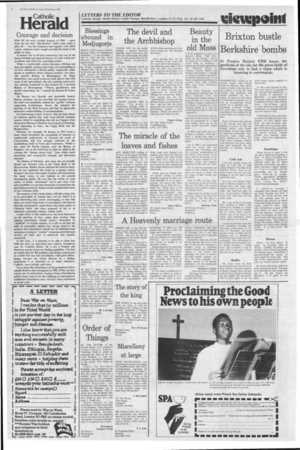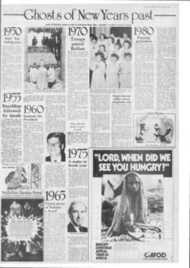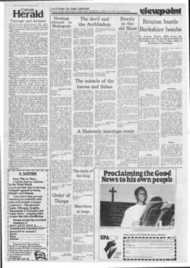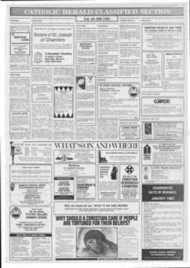Page 4, 28th December 1984
Page 4

Report an error
Noticed an error on this page?If you've noticed an error in this article please click here to report it.
Tags
Share
Related articles
A Cure Is Not Guaranteed But With Luck, You'll Be Infected
The Best Of All Possible Starts
Lives Close To God Inspire —
Good For Worcester!
A Vocations Exhibition Run By Laymen
Courage and decision
ONE OF the most notable features of 1984 — apart from the fact that "Big Brother" didn't quite make it after all — was the frequency and urgency with which various religious issues caught and held the mind of the public at large.
It matters not at all that controversy was one of the factors behind such general interest. It is this which stirs up debate and often has surprising results.
When a considerable scholar becomes a Bishop and then airs hightly controversial views, it is astonishing to see how vehemently a British public, supposedly rather docile or apathetic about religious matters, can react. The present Bishop of Birmingham, Dr Hugh Montefiore, has raised eyebrows from time to time with some of his speculations. But the resulting controversy was nothing compared to that aroused by a previous Bishop of Birmingham ("Whose parishioners had doubts concerning 'im,") namely the famous Dr Ernest Barnes.
Dr Barnes was likeable and absolutely honest. Herein, perhaps, was his downfall. He became known for what were popularly dubbed his "gorilla" sermons supporting evolutionary theory. He attacked the doctrine of the Real Presence and had an apparently' heterodox understanding of sacramentalism.
It is interesting to note, however, that the main thrust of criticism against him came from official Anglican sources which is something that did not happen when the present Bishop of Durham was accused of doubting, even appearing to deny, the Virgin Birth and the Resurrection.
Whereas, for example, Dr Barnes, in 1947 wrote a book which precluded the recognition of miracles as traditionally understood, he incurred the wrath of Convocation and was strongly criticised by the Archbishops both of York and Canterbury. Within a few years Dr David Jenkins, now the Bishop of Durham, was at the forefront of what he called in his writings the "debate about God," from which much interesting and constructive thought and discussion emerged.
The Bishop of Durham, since then, has not actually denied any doctrine such as the Virgin Birth or the Resurrection. Rather has he affirmed his belief in them. But he has explained this belief in a manner which, though it has been thoroughls familiar with theologians for many years, is not familiar to the general churchgoing public. He was thus the sictim, to some extent, of media "shorthand" and it only took a few scary headlines to convince thousands of people that the new Bishop positively denied certain fundamental tenets of the Christian faith.
The nuances of the whole debate will take a long time to be unravelled, if, indeed, they ever are. Built is at least interesting and, surely encouraging, to note that there was such a large body of churchgoers who showed that they passionately cared about these basic points of Christian belief and were prepared to say so in vehement, sometimes almost, violent terms.
A side effect of the controversy has been discussion on the question of how, rather than whether. high ranking churchmen should involve themselves in "political" or secular matters. It is safe to say that the bulk of reasonable opinion has swung round to the position that churchmen should not be inhibited from speaking or acting in "secular" situations provided such activity on their part is selectively and sensibly conducted.
In this sense, it is pleasing to be able to claim that 1984 has been an important and, indeed, triumphant year for Cardinal Hume. He is not a Primate and therefore can lay down no binding guidelines. Not that he would want to! His guidance has always come across in a fairly low key but nevertheless with great clarity, largely because his whole lifestyle as a leading churchman is so attractive to so many onlookers, Catholic, non-Catholic and other.
Let us hope that churchmen of all persuasions will be equally decisive and courageous in 1985. If they are they can be sure of enthusiastic response from a churchgoing public whose concern for the wellbeing of contemporary traditional Christianity may well have been underrated in recent years.
blog comments powered by Disqus









